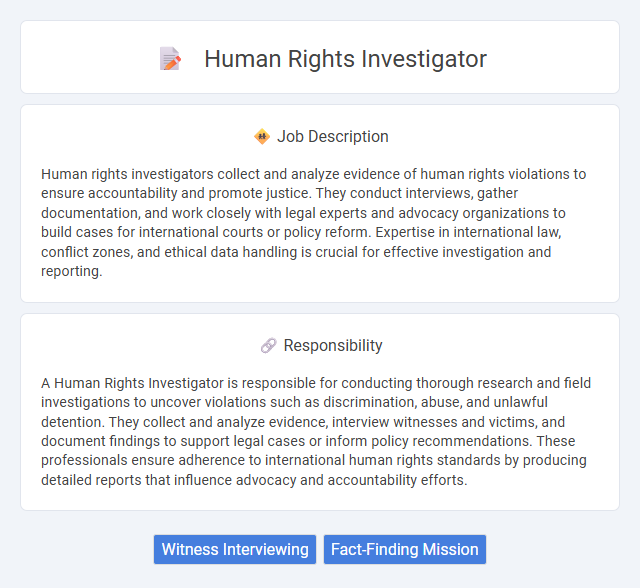
Human rights investigators collect and analyze evidence of human rights violations to ensure accountability and promote justice. They conduct interviews, gather documentation, and work closely with legal experts and advocacy organizations to build cases for international courts or policy reform. Expertise in international law, conflict zones, and ethical data handling is crucial for effective investigation and reporting.
Individuals with a strong sense of empathy and resilience are likely suitable for a human rights investigator role, as the job often involves examining difficult living conditions and injustices faced by vulnerable populations. Those who can handle emotional stress and maintain objectivity while documenting abuses may have a higher probability of success in this position. The role might be less suitable for people who struggle with confronting distressing situations or require a stable and predictable work environment.
Qualification
A Human Rights Investigator typically holds a bachelor's or master's degree in human rights, law, political science, or international relations, with specialized training in investigative techniques and legal frameworks. Strong analytical skills, proficiency in data collection, and experience in field research are essential qualifications, along with fluency in multiple languages to navigate diverse cultural contexts. Knowledge of international human rights law, documentation processes, and evidence management is critical for effective case analysis and reporting.
Responsibility
A Human Rights Investigator is responsible for conducting thorough research and field investigations to uncover violations such as discrimination, abuse, and unlawful detention. They collect and analyze evidence, interview witnesses and victims, and document findings to support legal cases or inform policy recommendations. These professionals ensure adherence to international human rights standards by producing detailed reports that influence advocacy and accountability efforts.
Benefit
A Human Rights Investigator likely offers significant benefits such as the opportunity to contribute to social justice and hold violators accountable, enhancing personal fulfillment. The role probably provides valuable skills in research, analysis, and advocacy, which can advance career prospects in law, international relations, or non-governmental organizations. Exposure to diverse cultures and complex legal frameworks might also broaden professional networks and deepen understanding of global human rights issues.
Challenge
Human rights investigators likely face complex challenges including navigating hostile environments and gathering reliable evidence under threat or intimidation. They may encounter bureaucratic resistance and limited access to crucial information, complicating efforts to document violations accurately. The role probably demands resilience and adaptability to balance ethical obligations with personal safety risks.
Career Advancement
Human rights investigators develop expertise in collecting and analyzing data on human rights violations, enabling career progression into senior roles such as legal analyst, policy advisor, or international consultant. Gaining field experience and advanced degrees in law, political science, or international relations significantly enhances opportunities for leadership positions within NGOs, government agencies, or international organizations like the United Nations. Mastery of investigative techniques, report writing, and advocacy also contributes to upward mobility and specialization in human rights law or transitional justice.
Key Terms
Witness Interviewing
Human rights investigators specialize in witness interviewing to gather reliable testimonies that document violations and abuses. They apply advanced questioning techniques to ensure accuracy, build trust, and protect interviewees' safety and confidentiality. Effective witness interviewing is crucial for compiling credible evidence used in legal proceedings and human rights advocacy.
Fact-Finding Mission
Human rights investigators conduct Fact-Finding Missions to gather reliable evidence and document violations of international human rights law. These missions involve interviewing witnesses, collecting testimonies, and analyzing physical and digital evidence in conflict or crisis zones. Accurate documentation from Fact-Finding Missions supports litigation, accountability, and advocacy efforts by organizations such as the United Nations and Amnesty International.
 kuljobs.com
kuljobs.com